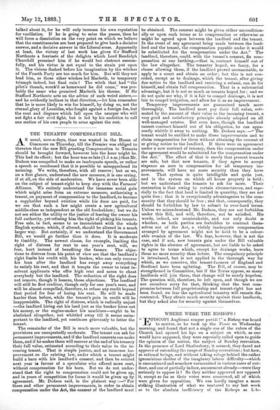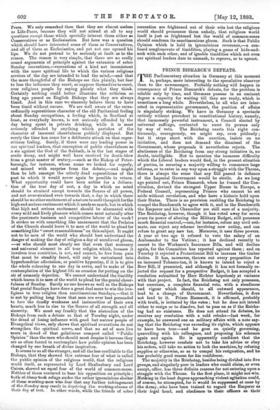WHERE WERE THE BISHOPS
" EPISCOPI Anglicani semper pavidi I" a Bishop was heard to mutter, as he took up the Times on Wednesday morning, and found that not a single one of the rulers of the Church had opened his lip3 on a subject on which, as one would have supposed, they were especially called upon to guide the opinion of the nation, the subject of Sunday recreation. In the presence of Lord Shaftesbury, it seemed, they dared not approve of extending the range of Sunday recreations ; but how, as rational beings, and without taking refuge behind the rather ignominious shelter of the imaginary labour difficulty—which is encountered and somehow surmounted in various cases of out- door, and one of partially indoor, amusement already—were they seriously to oppose it I So they neither approved nor opposed it, except so far as their votes were concerned, all of which were given for opposition. We can hardly imagine a more striking illustration of what we ventured to say last week as to the absolute inefficieney of the Bishops as Lie- Peers. We only remarked then that they are almost useless as Life-Peers, because they will not attend at all to any questions except those which specially interest them either as Conservatives or as Ecclesiastics. But here was a question. which should have interested some of them as Conservatives, and all of them as Ecclesiastics, and yet not one opened his lips. We do not pretend to be seriously at fault as to the reason. The reason is very simple, that there are no really sound arguments of principle against the extension of sober Sunday recreations,—recreations of a kind not inconsistent- with the more spiritual life to which the various religious services of the day are intended to lead the mind,—and that the more thoughtful of the Bishops see this plainly, but fear to lose the influence they exert, or suppose themselves to exert, over religious people by saying plainly what they think. Certainly nothing could better illustrate the criticism so long ago passed on English Bishops that they are always timid. And in this case we sincerely believe them to have been timid without excuse. We are well aware of the extra- ordinarily superstitious character of the old Puritanical feeling about Sunday occupations, a feeling which, in Scotland at least, as everybody knows, is not seriously offended by the day being spent in private drinking, while it is most seriously offended by anything which partakes of the character of innocent cheerfulness publicly displayed. But surely the time has come for a deliberate attack on that super- stitious feeling. Surely, if there were any leading power in our spiritual leaders, that conception of public cheerfulness as a sin against the God of the Sabbath, is in the last stages of senile decay, and might well have received its death-blow from a great master of oratory,--auch as the Bishop of Peter- borough, for instance, whose name we looked for eagerly, and missed with surprise from the debate,—and might then be left amongst the utterly dead superstitions of the past to which it would never again be possible to return. What opportunity could have been nobler for a delinea- tion of the true day of rest, a day in which no mind should be strained except towards the Source of all power, and not over-strained even towards that, a day in which there should be no other excitement of a nature to unfit the spirit for the high and serious excitement which it needs so much, but in which that high and serious excitement should be alternated with every mild and lively pleasure which comes most naturally after the passionate business and competitive labour of the week It strikes us with something like amazement that the Prelates of the Church should leave it to men of the world to plead for something like "sweet reasonableness" on this subject. It ought not to be men of the world who should best understand the danger of making the day of religion a day of unrelieved gloom, —or who should most clearly see that even that necessary and universal element in all true religion which, because it involves true contrition, is not, and cannot, be free from pain that must be steadily faced, will only be caricatured into hypochondriac affectation, or positive hypocrisy, if it is to give the whole colouring to one day in seven, and to make of the contemplation of the highest life an occasion for putting on the air of unmanly dejection. We cannot understand the timidity which leaves it to men of the world to plead for the genial cheer- fulness of Sunday. Surely no one knows so well as the Bishops that genial Sundays have done a great deal more to win the irre- ligious to true religion than sanctimonious Sundays,—that it is not by-pulling long faces that men are ever beat persuaded to face the deadly weakness and insincerities of their own hearts, much less to rise to the Source of all strength and all sincerity. We must say frankly that the abstention of the Bishops from such a debate as that of Tuesday night, under the dread of losing influence with good but narrow people of Evangelical views, only shows that spiritual avocations do not strengthen the spiritual nerve, and that no set of men live more in dread of that gelatinous compost called "Public Opinion" than the men who should most despise it because they are so often forced to contemplate how public opinion has been changed by one breath of divine inspiration.
It seems to us all the stranger, and all the less creditable to the Bishops, that they showed this extreme fear of what is called the public opinion of the religious world, that the religious world itself, as represented by Lord Shaftesbury and Lord Cairns, showed an equal fear of the world of common-sense. Neither of them ventured to base his opposition on principle ; 43oth,of..thenaiocsk refuge ainder,the rather ignominious shelter of Athoae w orking-mezr who fear that any further infringement of atheSunday mar result in ,depviving the-, working-classes of their day of rest. Iii other words, while the friends of sober
recreation are frightened out of their wits lest the religious world should pronounce them unholy, that religious world itself is just as frightened lest the world of common-sense should condemn its sanctimonious gloom. Such is that Public Opinion which is held in ignominious reverence,—a con- fused conglomerate of timidities, playing a game of hide-and- seek with each other, and of ignoble timidities which not even our spiritual leaders dare to unmask, to reprove, or to uproot.



































 Previous page
Previous page